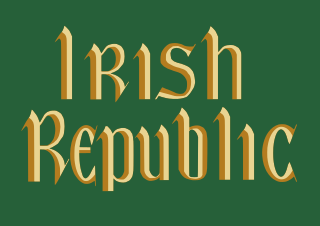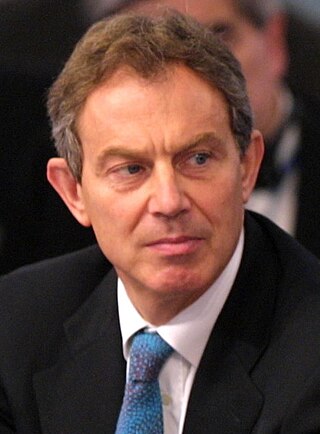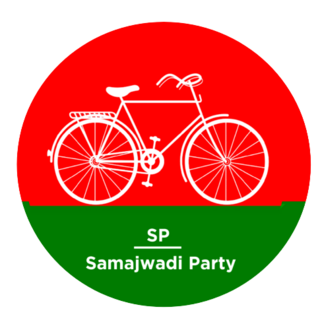Related Research Articles

Sinn Féin is an Irish republican and democratic socialist political party in both the Republic of Ireland and Northern Ireland.

The Republican Party, also referred to as the GOP, is one of the two major contemporary political parties in the United States. The GOP was founded in 1854 by anti-slavery activists who opposed the Kansas–Nebraska Act, which allowed for the potential expansion of chattel slavery into the western territories. It has been the main political rival of the Democratic Party since the mid-1850s. Like them, the Republican Party is a big tent of competing and often opposing ideologies. Presently, the Republican Party contains prominent conservative, centrist, populist, and right-libertarian factions.
The Conservative Party, officially the Conservative and Unionist Party and also known colloquially as the Tories, is one of the two main political parties in the United Kingdom, along with the Labour Party. It is the current governing party, having won the 2019 general election. It has been the primary governing party in the United Kingdom since 2010. The party is on the centre-right of the political spectrum, and encompasses various ideological factions including one-nation conservatives, Thatcherites, and traditionalist conservatives. The party currently has 355 Members of Parliament, 260 members of the House of Lords, 9 members of the London Assembly, 31 members of the Scottish Parliament, 16 members of the Welsh Parliament, 4 directly elected mayors, 30 police and crime commissioners, and around 6,619 local councillors. It holds the annual Conservative Party Conference.

The 1997 United Kingdom general election was held on Thursday, 1 May 1997. The governing Conservative Party led by Prime Minister John Major was defeated in a landslide by the Labour Party led by Tony Blair, achieving a 179-seat majority.

The Bharatiya Janata Party is a political party in India, and one of the two major Indian political parties alongside the Indian National Congress. Since 2014, it has been the ruling political party in India under Narendra Modi, the incumbent Indian prime minister. The BJP is aligned with right-wing politics, and its policies have historically reflected a traditional Hindu nationalist ideology; it has close ideological and organisational links to the Rashtriya Swayamsevak Sangh (RSS). As of March 2023, it is the country's largest political party in terms of representation in the Parliament of India as well as state legislatures.

The Indian National Congress (INC), colloquially the Congress Party but often simply the Congress, is a political party in India with widespread roots. Founded in 1885, it was the first modern nationalist movement to emerge in the British Empire in Asia and Africa. From the late 19th century, and especially after 1920, under the leadership of Mahatma Gandhi, the Congress became the principal leader of the Indian independence movement. The Congress led India to independence from the United Kingdom, and significantly influenced other anti-colonial nationalist movements in the British Empire.

The Republican People's Party is a Kemalist and social democratic political party in Turkey which is currently the main opposition party. It is also the oldest political party in Turkey, founded by Mustafa Kemal Atatürk, the first president and founder of the modern Turkish Republic. The party is also cited as the founding party of modern Turkey. Its logo consists of the Six Arrows, which represent the foundational principles of Kemalism: republicanism, reformism, laicism (Laïcité/Secularism), populism, nationalism, and statism. It is currently the second largest party in Grand National Assembly with 135 MPs, behind the ruling conservative Justice and Development Party (AKP).

The Communist Party of India (Marxist) (abbreviated as CPI(M)/CPIM/CPM) is a communist political party in India. It is the largest communist party in India in terms of membership and electoral seats and one of the national parties of India. The party emerged from a split in the Communist Party of India (CPI) on 7 November 1964. As of 2022, CPI(M) is a part of ruling alliances in three states — the Left Democratic Front in Kerala, Mahagathbandhan in Bihar, and the Secular Progressive Alliance in Tamil Nadu. CPIM has representation in the legislative assemblies of 8 states.

The Samajwadi Party is a socialist political party in India. Headquartered in New Delhi, the party has mass base in Uttar Pradesh along with significant presence in other states as well. With a secular and democratic ideology, the Samajwadi Party believes in creating a socialist society, which works on the principle of equality. The party has been able to form the government in the state of Uttar Pradesh four times - three times under Chief Minister Mulayam Singh Yadav, the fourth and recent being Chief Minister Akhilesh Yadav’s full majority government in 2012-2017 Uttar Pradesh Legislative Assembly. The coalition of party and it’s alliance partners SP+ has one of the largest vote base in the state of Uttar Pradesh in terms of collective voting pattern in the state-based electoral system, with more than 37% vote share in 2022 elections.

The All India Trinamool Congress is an Indian national political party with great influence in the state of West Bengal. It is a congress party founded by the former Minister of Railways of the Republic of India Mamata Banerjee (Didi) on 1 January 1998 as a breakaway faction from the Indian National Congress. The party has won a three-time majority in the West Bengal Legislative Assembly and has been the ruling party in West Bengal since 20 May 2011. AITC is led by Mamata Banerjee as the chairperson of the party.
An independent or non-partisan politician is a politician not affiliated with any political party or bureaucratic association. There are numerous reasons why someone may stand for office as an independent.

The Democratic Party is one of two major contemporary political parties in the United States. Founded in 1828, it was predominantly built by Martin Van Buren, who assembled politicians in every state behind war hero Andrew Jackson, making it the world's oldest active political party. Its main political rival has been the Republican Party since the 1850s, with both parties being big tents of competing and often opposing viewpoints. Modern American liberalism — a variant of social liberalism — is the party's majority ideology. The party also has notable centrist, social democratic, and left-libertarian factions.

The Liberal Democrats are a liberal political party in the United Kingdom. Since the 1992 general election, with the exception of the 2015 general election, they have been the third-largest UK political party by the number of votes cast. They have 14 Members of Parliament in the House of Commons, 83 members of the House of Lords, four Members of the Scottish Parliament and one member in the Welsh Senedd. The party has over 2,500 local council seats. The party holds a twice-per-year Liberal Democrat Conference, at which party policy is formulated. In contrast to its main opponents' conference rules, the Lib Dems grant all members attending its Conference the right to speak in debates and vote on party policy, under a one member, one vote system. The party also allows its members to vote online. The party served as the junior party in a coalition government with the Conservative Party between 2010 and 2015; with Scottish Labour in the Scottish Executive from 1999 to 2007, and with Welsh Labour in the Welsh Government from 2000 to 2003 and from 2016 to 2021.
The Labour Party is a political party in the United Kingdom that has been described as an alliance of social democrats, democratic socialists and trade unionists. The Labour Party sits on the centre-left of the political spectrum. In all general elections since 1922, Labour has been either the governing party or the Official Opposition. There have been six Labour prime ministers and thirteen Labour ministries. Since the 2010 general election, it has been the second-largest UK political party by the number of votes cast, behind the Conservative Party and ahead of the Liberal Democrats. The party holds the annual Labour Party Conference, at which party policy is formulated.

The All Progressives Congress (APC) is one of the three major contemporary political parties in Nigeria, along with the Peoples Democratic Party (PDP) and the Labour Party (LP). Founded on 6 February 2013 from a merger of Nigeria's three largest opposition parties, the party came to power following the victory of party candidate Muhammadu Buhari in the 2015 presidential election. This marked the first time in Nigerian history that an opposition party unseated a governing party and power was transferred peacefully.

The 2015 United Kingdom general election was held on Thursday, 7 May 2015 to elect 650 Members of Parliament to the House of Commons. It was the only general election held under the rules of the Fixed-term Parliaments Act 2011. Local elections took place in most areas on the same day.

The 2019 United Kingdom general election was held on Thursday, 12 December 2019. It resulted in the Conservative Party receiving a landslide majority of 80 seats. The Conservatives made a net gain of 48 seats and won 43.6% of the popular vote – the highest percentage for any party since 1979.

The 2024 United States presidential election will be the 60th quadrennial presidential election, scheduled for Tuesday, November 5, 2024. It will be the first presidential election after electoral votes were redistributed during the 2020 census reapportionment cycle. The incumbent, President Joe Biden, stated in January 2022 his intent to run for reelection with Vice President Kamala Harris as his running mate. As of March 2023, Biden has not formally announced a reelection campaign. In November 2022, former president Donald Trump announced his candidacy for president for a second, nonconsecutive term. In the United States, general elections follow caucuses and primary elections held by the major parties to determine their nominees. The winner of the 2024 presidential election is scheduled to be inaugurated on January 20, 2025.
The next United Kingdom general election is scheduled to be held no later than 28 January 2025. It will determine the composition of the House of Commons.
References
- ↑ Jaensch, Dean. A plague on both your houses